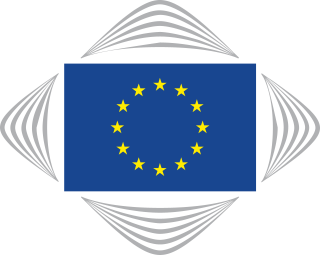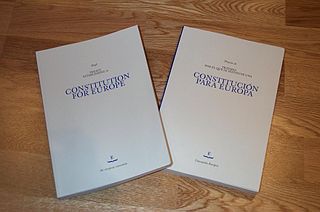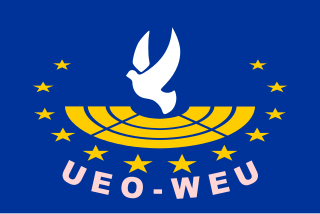
The European Parliament (EP) is one of the legislative bodies of the European Union and one of its seven institutions. Together with the Council of the European Union, it adopts European legislation, following a proposal by the European Commission. The Parliament is composed of 705 members (MEPs). It represents the second-largest democratic electorate in the world, with an electorate of 375 million eligible voters in 2009.

The Treaty on European Union, commonly known as the Maastricht Treaty, is the foundation treaty of the European Union (EU). Concluded in 1992 between the then-twelve member states of the European Communities, it announced "a new stage in the process of European integration" chiefly in provisions for a shared European citizenship, for the eventual introduction of a single currency, and for common foreign and security policies. Although these were widely seen to presage a "federal Europe", the focus of constitutional debate shifted to the later 2007 Treaty of Lisbon. In the wake of the Eurozone debt crisis unfolding from 2009, the most enduring reference to the Maastricht Treaty has been to the rules of compliance – the "Maastricht criteria" – for the currency union.

The European Committee of the Regions (CoR) is the European Union's (EU) assembly of local and regional representatives that provides sub-national authorities with a direct voice within the EU's institutional framework.

The Treaty establishing a Constitution for Europe was an unratified international treaty intended to create a consolidated constitution for the European Union (EU). It would have replaced the existing European Union treaties with a single text, given legal force to the Charter of Fundamental Rights, and expanded qualified majority voting into policy areas which had previously been decided by unanimity among member states.

The apportionment of seats within the European Parliament to each member state of the European Union is set out by the EU treaties. According to European Union treaties, the distribution of seats is "degressively proportional" to the population of the member states, with negotiations and agreements between member states playing a role. Thus the allocation of seats is not strictly proportional to the size of a state's population, nor does it reflect any other automatically triggered or fixed mathematical formula. The process can be compared to the composition of the electoral college used to elect the President of the United States of America in that, pro rata, the smaller state received more places in the electoral college than the more populous states.

The Conference of Parliamentary Committees for Union Affairs of Parliaments of the European Union (COSAC) is a conference of Members of the European Parliament (MEPs) and national Members of Parliament (MPs) who are drawn from parliamentary committees responsible for European Union affairs.

The European Union adopts legislation through a variety of legislative procedures. The procedure used for a given legislative proposal depends on the policy area in question. Most legislation needs to be proposed by the European Commission and approved by the Council of the European Union and European Parliament to become law.

The European Union Committee is a select committee of the House of Lords in the Parliament of the United Kingdom. Its terms of reference are "To consider European Union documents and other matters relating to the European Union", as well as "to represent the House as appropriate in interparliamentary co-operation within the European Union".

The Assembly of the Western European Union, also called the European Security and Defence Assembly, was a parliamentary assembly for delegations from the national parliaments of the member countries of the Western European Union (WEU), a security and defence organisation. Its final session was on 10 May 2011.

In general, the law of the European Union is valid in all of the twenty-seven European Union member states. However, occasionally member states negotiate certain opt-outs from legislation or treaties of the European Union, meaning they do not have to participate in certain policy areas. Currently, three states have such opt-outs: Denmark, Ireland and Poland. The United Kingdom had four opt-outs before leaving the Union.
European Union (EU) concepts, acronyms, and jargon are a terminology set that has developed as a form of shorthand, to quickly express a (formal) EU process, an (informal) institutional working practice, or an EU body, function or decision, and which is commonly understood among EU officials or external people who regularly deal with EU institutions.

The national parliaments of the European Union are those legislatures responsible for each member state of the European Union (EU). They have a certain degree of institutionalised influence which was expanded under the Treaty of Lisbon to include greater ability to scrutinise proposed European Union law.

The Treaty of Lisbon is an international agreement that amends the two treaties which form the constitutional basis of the European Union (EU). The Treaty of Lisbon, which was signed by the EU member states on 13 December 2007, entered into force on 1 December 2009. It amends the Maastricht Treaty (1992), known in updated form as the Treaty on European Union (2007) or TEU, as well as the Treaty of Rome (1957), known in updated form as the Treaty on the Functioning of the European Union (2007) or TFEU. It also amends the attached treaty protocols as well as the Treaty establishing the European Atomic Energy Community (EURATOM).

The following is a list of committees in the States General of the Netherlands.
The Committee on European Affairs and Oversight of the European Funds (CEAOEF) is one of the 17 standing committees in the 41st National Assembly of the Republic of Bulgaria.

Monika Panayotova is a Doctor of Political Science, with interests in the field of the EU security and defence policy. Bulgarian politician – Monika Panayotova has been appointed as Deputy Minister for the Bulgarian Presidency of the Council of the EU 2018, responsible for the relations with the European Parliament during the Bulgaria's presidency since June 28, 2017.

The Treaties of the European Union are a set of international treaties between the European Union (EU) member states which sets out the EU's constitutional basis. They establish the various EU institutions together with their remit, procedures and objectives. The EU can only act within the competences granted to it through these treaties and amendment to the treaties requires the agreement and ratification of every single signatory.

The Baltic Sea Parliamentary Conference (BSPC) was established in 1991 as a forum for political dialogue between parliamentarians from the Baltic Sea Region. BSPC aims at raising awareness and opinion on issues of current political interest and relevance for the Baltic Sea Region. It promotes and drives various initiatives and efforts to support a sustainable environmental, social and economic development of the Baltic Sea Region. It strives at enhancing the visibility of the Baltic Sea Region and its issues in a wider European context.
In the European Union, the principle of subsidiarity is the principle that decisions are retained by Member States if the intervention of the European Union is not necessary. The European Union should take action collectively only when Member States’ power is insufficient. The principle of subsidiarity applied to the European Union can be summarised as "Europe where necessary, national where possible".

The United Kingdom was a member state of the European Union and of its predecessor the European Communities from 1973 until 2020. Since the foundation of the European Communities, it has been an important neighbour, and was a leading member state until its withdrawal from the EU on 31 January 2020 as a result of Brexit, ending 47 years of membership.












